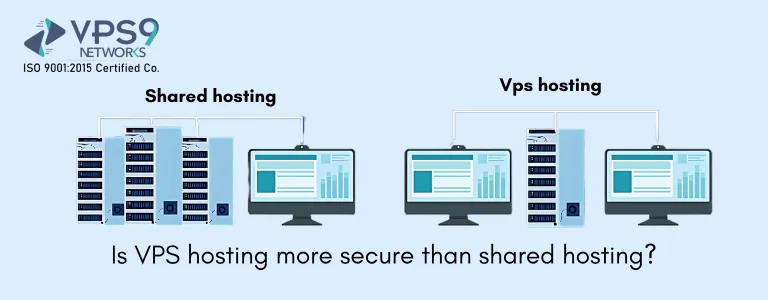
In the world of web hosting, security is paramount for businesses and individuals alike. Choosing the right hosting solution plays a crucial role in protecting websites, applications, and data from potential threats and vulnerabilities. Two popular hosting options often considered for their security implications are
Virtual Private Server (VPS) hosting and shared hosting. In this guide, we will delve into the security aspects of both to help you make an informed decision for your hosting needs.
Understanding VPS Hosting and Shared Hosting
Before we dive into the security comparison, let’s take a brief look at what VPS hosting and shared hosting entail:
- VPS Hosting: VPS hosting involves partitioning a physical server into multiple virtual servers, each operating as an independent environment with dedicated resources like CPU, RAM, storage, and bandwidth. Although multiple VPS instances share the same physical hardware, they are isolated from each other, offering privacy, control, and customisation.
- Shared hosting: On the other hand, Shared hosting, in contrast, hosts multiple websites on the same server, where resources are shared among all users. This shared environment provides an affordable hosting solution but can lead to resource contention, performance issues, and heightened security risks due to shared resources.

Security Comparison: VPS Hosting vs Shared Hosting
Now, let’s find out how VPS hosting and shared hosting compare in terms of security:
Isolation and Resource Allocation:
- VPS Hosting: VPS hosting provides greater isolation between users by allocating dedicated resources to each virtual server. This isolation prevents the “noisy neighbour” effect often associated with shared hosting, where the resource-consuming activities of one user can affect the performance of others
- Shared Hosting: Shared hosting shares resources among multiple users, increasing the risk of resource disputes and operational challenges. While hosting providers use distributed resources to mitigate these issues, shared locations pose inherent security risks, especially if a web page on the server is compromised.
Control and Customization
- VPS Hosting: VPS hosting gives users full root access and control over their virtual servers, and allows them to install custom software, configure security settings, and implement additional layers of security This level of control enables users to harden their server environment, optimizing security to suit their specific needs. It also enables different actions to be applied.
- Shared Hosting: Shared hosting often prevents users from changing server configuration and installing new security measures due to shared resources While hosting providers implement security measures at the server level, users have little control over personal account security and policies.
Server Management and Upgrades
- VPS Hosting: With VPS hosting, users are responsible for managing their virtual servers, including installing software updates, applying security patches, and implementing security protocols This hands-on approach to server management allows users to be more aware and compliant with security measures but technical expertise and proactive maintenance Is required.
- Shared hosting: Shared hosting providers handle server management tasks for users, such as software updates, security patches, and server maintenance. While this reduces the burden of server management for users, it also means the hosting provider will be relied upon to quickly address security vulnerabilities and apply updates to all delayed accounts on Comparative.
Risk and Frontline Attack
- VPS Hosting: VPS hosting isolates each virtual server from the others reducing the risk of disruption compared to shared hosting. Even if one VPS instance is compromised, it does not directly affect the security of other virtual servers on the same physical hardware.
- Shared Hosting: Shared hosting carries a high risk of being compromised due to a shared environment, where a vulnerable website can act as a vector for an attack that affects other websites on the same server.

Considering choosing the right hosting solution
Consider the following factors when considering VPS hosting and shared hosting from a security perspective:
- Risk Tolerance: Assess your tolerance for security risks based on data sensitivity, application criticality, and compliance requirements.
- Technical expertise: Consider your level of technical expertise in managing server configuration, security settings, and updates. VPS hosting requires more involvement in server management as compared to shared hosting.
- Budget and Resources: Determine budget constraints and resource needs to balance cost-effectiveness with security, performance, and scalability.
- Scalability and growth: Determine future growth and scalability needs for your website or application platform, considering how each hosting solution can accommodate increasing traffic and resources over time.
- Provider Reputation and Support: Research the reputation, track record, and security practices of hosting providers. Assess their support capabilities in managing security incidents and implementing proactive measures.
conclusion
In conclusion, VPS hosting and shared hosting offer distinct security features and considerations. While VPS hosting provides enhanced isolation, control, and customization options, shared hosting offers affordability and managed services. Your choice between the two should align with your security needs, technical capabilities, budget constraints, and growth objectives. Whether you opt for VPS hosting or shared hosting, proactive security practices, regular updates, and vigilance are essential to safeguarding your online presence from evolving threats and vulnerabilities.

